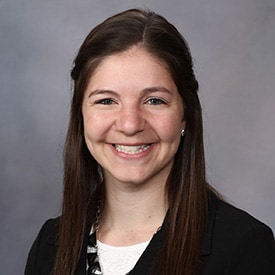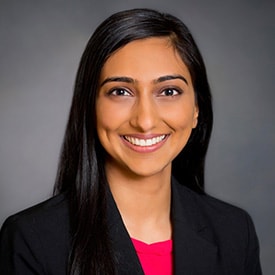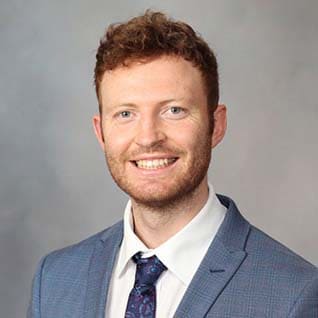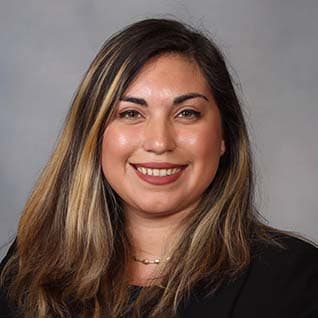Curriculum
/prod01/channel_2/media/mccms/content-assets/academics/residencies-and-fellowships/pediatric-and-adolescent-medicine-residency-mn/ped-adol-med-res-mn-1024X512-curriculum-overview-summer-and-charlie.jpg)
Philosophy and approach to clinical training
Our three-year Pediatric and Adolescent Medicine Residency is designed to develop confident, capable, and well-rounded pediatricians, prepared for any career path, whether general pediatrics or competitive subspecialty fellowships. Residents build increasing autonomy as they progress, gaining the skills and experience to independently manage the core responsibilities of pediatric care.
We meet all ACGME program requirements and follow an X + Y scheduling model with two- to four-week blocks,without any 24-hour shifts. This structure separates inpatient and outpatient experiences, allowing residents to focus deeply on each aspect of training without the distraction of cross-coverage.
Our Y blocks include continuity clinic and ambulatory rotations, free from inpatient duties. This promotes better work-life balance, stronger relationships with patients and preceptors, and more consistent outpatient learning.
Continuity Clinic (CCL)
Residents lead their own patient panels in an integrated, community-based primary care clinic, providing longitudinal care for children and adolescents. You’ll build foundational skills in preventive care, acute and chronic disease management, mental health, and office-based procedures, with increasing autonomy over time. Co-residents share coverage to support learning and continuity.
Core Inpatient Rotations (X)
General Pediatrics Hospital Service (GPHS)
Residents manage a wide spectrum of acute and complex pediatric illnesses and lead multidisciplinary teams.
Neonatal Intensive Care Unit (NICU)
Residents care for critically ill and premature newborns, gaining experience in stabilization, resuscitation, and essential NICU procedures.
Newborn Nursery and Resuscitation
Residents attend deliveries, stabilize newborns, and manage the care and discharge of well and at-risk infants.
Pediatric Intensive Care Unit (PICU)
Residents provide comprehensive care for critically ill children, including trauma and post-surgical patients, while developing advanced resuscitation and procedural skills.
Pediatric Hematology-Oncology Service
Residents care for children with cancer and blood disorders as part of a multidisciplinary team, gaining exposure to both acute management and supportive care.
 "A strength of my residency training was the flexibility to tailor my educational experience to fit my personal career goals, including my future as a pediatric intensivist. I found ample support on my PICU rotations, and mentorship outside of the unit to navigate research projects and academic opportunities, such as becoming an instructor for Pediatric Fundamentals Critical Care Support, a standardized course that provides exposure to principles of pediatric critical care. I easily filled my elective time with rotations that helped build a solid foundation of knowledge for fellowship including cardiology, palliative care medicine, cardiac intensive care, and even a PICU away rotation." —Jordon Mitzelfelt, M.D., now a fellow in critical care at Children’s Mercy in Kansas City
"A strength of my residency training was the flexibility to tailor my educational experience to fit my personal career goals, including my future as a pediatric intensivist. I found ample support on my PICU rotations, and mentorship outside of the unit to navigate research projects and academic opportunities, such as becoming an instructor for Pediatric Fundamentals Critical Care Support, a standardized course that provides exposure to principles of pediatric critical care. I easily filled my elective time with rotations that helped build a solid foundation of knowledge for fellowship including cardiology, palliative care medicine, cardiac intensive care, and even a PICU away rotation." —Jordon Mitzelfelt, M.D., now a fellow in critical care at Children’s Mercy in Kansas City
Core Outpatient Rotations (Y)
Community Pediatric and Adolescent Medicine (CPAM)
Dedicated primary care rotations, where residents deliver primary care to a diverse patient population and gain experience and exposure to the public health department, refugee clinic, and local school districts.
Pediatric Emergency Medicine (PEM)
Residents manage acute illnesses and injuries, perform procedures, and gain experience in trauma and sedation in the emergency department.
Adolescent Medicine
Residents care for teens with a focus on adolescent gynecology, mental health, and sports medicine in the outpatient setting.
Developmental and Behavioral Pediatrics (DBP)
Residents assess and manage children with developmental, behavioral, and learning challenges, working with a multidisciplinary team and participating in community-based site visits.
Ambulatory Subspecialty Rotation
Residents spend one week in each of four different outpatient subspecialty clinics, learning about common referral conditions and developing specialty-specific history, exam, and diagnostic skills. This rotation offers a comprehensive outpatient experience, providing perspectives that strengthen general pediatric practice and help residents explore subspecialties for future fellowship opportunities.
Mental Health Rotation
Residents develop skills in assessing and managing children and adolescents with a wide range of mental health disorders. Training occurs in multidisciplinary teams across diverse settings, including school-based programs, community clinics, intensive specialty treatment centers, and inpatient psychiatry.
 "I am deeply thankful for my training at Mayo Clinic. The program offers residents the flexibility to tailor their learning to align with their career goals. I found mentors who made sure my clinical skills, research, and wellbeing were always a priority. But above all, I had the privilege of training with a close-knit group that became my closest friends, showing me the importance of surrounding myself with the right colleagues and mentors when selecting a fellowship and, later, a job. If I had to choose a residency program again, I would choose this one without any hesitation." —Jenny Patel, M.D., now a fellow in rheumatology and immunology, at Washington University in St. Louis
"I am deeply thankful for my training at Mayo Clinic. The program offers residents the flexibility to tailor their learning to align with their career goals. I found mentors who made sure my clinical skills, research, and wellbeing were always a priority. But above all, I had the privilege of training with a close-knit group that became my closest friends, showing me the importance of surrounding myself with the right colleagues and mentors when selecting a fellowship and, later, a job. If I had to choose a residency program again, I would choose this one without any hesitation." —Jenny Patel, M.D., now a fellow in rheumatology and immunology, at Washington University in St. Louis
Elective Rotations
At Mayo Clinic, residents enjoy a wide range of elective opportunities that go far beyond traditional clinical rotations. You can personalize your training with electives in global health, medical education, healthcare innovation, and technology. Distinctive options include a medical journalism elective with ABC News in New York City, hands-on experiences in artificial intelligence and healthcare delivery science, and an innovative elective in clinical entrepreneurship.
Supported by Mayo’s exceptional resources, expert faculty, and a collaborative culture, you have the freedom to explore areas that match your interests and goals. Whether you are aiming for leadership, advocacy, research, or clinical expertise, our electives offer both depth and breadth to help you shape your career and pursue your passions.
 “At Mayo Clinic, I wasn’t just encouraged to explore AI, I was equipped to do it. Mentorship, collaboration, and access to data-science expertise turned a resident’s curiosity into peer-reviewed AI-enabled ECG research and the development of a knowledge base in AI-driven congenital cardiology that continues to shape my work.” – Donnchadh O’Sullivan, now a fellow in Cardiology at Texas Children’s Hospital, Baylor College of Medicine
“At Mayo Clinic, I wasn’t just encouraged to explore AI, I was equipped to do it. Mentorship, collaboration, and access to data-science expertise turned a resident’s curiosity into peer-reviewed AI-enabled ECG research and the development of a knowledge base in AI-driven congenital cardiology that continues to shape my work.” – Donnchadh O’Sullivan, now a fellow in Cardiology at Texas Children’s Hospital, Baylor College of Medicine
 "The ABC News Medical Unit is an excellent opportunity for residents to learn more about how the medicine they are practicing and the skills they are developing can impact people on a broad, nationwide level. Residents work at the ABC News headquarters in New York City, where they utilize their expertise to assist the Medical Unit in vetting news stories, analyzing the latest research and journal publications, and contributing to ABC News stories. Learning how breaking medical news is broken down, digested, and then formed into information that the general public can utilize is not only fascinating but also an essential skill for a physician. Our program director, Dr. Pittock, told me about this program after learning of my special interest in journalism, and she was my biggest cheerleader as I applied for the elective. Our residency program was so invested in helping me tailor this experience and was incredibly supportive throughout the process. The flexibility of our program allowed me to get the most out of my month in New York City." – Amanda Hargett-Granato, current PGY-3, Mayo Clinic
"The ABC News Medical Unit is an excellent opportunity for residents to learn more about how the medicine they are practicing and the skills they are developing can impact people on a broad, nationwide level. Residents work at the ABC News headquarters in New York City, where they utilize their expertise to assist the Medical Unit in vetting news stories, analyzing the latest research and journal publications, and contributing to ABC News stories. Learning how breaking medical news is broken down, digested, and then formed into information that the general public can utilize is not only fascinating but also an essential skill for a physician. Our program director, Dr. Pittock, told me about this program after learning of my special interest in journalism, and she was my biggest cheerleader as I applied for the elective. Our residency program was so invested in helping me tailor this experience and was incredibly supportive throughout the process. The flexibility of our program allowed me to get the most out of my month in New York City." – Amanda Hargett-Granato, current PGY-3, Mayo Clinic
Numerous elective rotations are available to pediatric residents at Mayo Clinic, including:
| Adolescent Gynecology | Artificial Intelligence (AI) in Medicine | Cardiovascular Intensive Care | Child and Family Advocacy | Child Neurology |
| Child Psychiatry | Clinical and Innovation Entrepreneurship | Global Health | Healthcare Delivery Service | Maxillofacial Surgery |
| Medical Education | Medical Genetics | Medical Journalism | Pediatric Allergy and Immunology | Pediatric Anesthesiology |
| Pediatric Cardiology | Pediatric Dermatology | Pediatric Endocrinology | Pediatric Gastroenterology and Hepatology | Pediatric Hematology and Oncology |
| Pediatric Infectious Diseases | Pediatric Nephrology | Pediatric Neurosurgery | Pediatric Nutrition | Pediatric Ophthalmology |
| Pediatric Orthopedic Surgery | Pediatric Otorhinolaryngology (ENT) | Pediatric Palliative Care | Pediatric PM&R | Pediatric Psychology |
| Pediatric Pulmonology | Pediatric Radiology | Pediatric Rheumatology | Pediatric Sleep Medicine | Pediatric Surgery |
| Plastic and Reconstructive Surgery | Practical Pediatrics | Research | Sports Medicine | And more! |
Special Clinical Rotation Opportunities
Tuba City Arizona IHS Rotation
Mayo Clinic School of GME and Tuba City Regional Health Care Corporation have a partnership that allows up to three pediatric residents every year to spend an elective with the Indian Health Service. Housing and transportation are provided during these rotations by the program.
International, Global Health Clinical Rotations
Residents may pursue one international elective during training to provide care to underserved international communities. Up to $3000 in financial support is available to residents who are selected by the Mayo International Health Program (MIHP) to help defray travel and basic living expenses. Such rotations are important in:
- Providing valuable hands-on care to underserved patients
- Promoting awareness of a new culture and experiencing it firsthand
- Ensuring exposure to the diagnosis and treatment of diseases not usually seen in modern Western medicine
- Increasing awareness of cost-effective care in a setting of limited resources
- Improving diagnostic examination skills
Diverse Elective Rotation Opportunities Across the United States
Residents can complete pediatric elective rotations at sites beyond Rochester, including children’s hospitals near Mayo Clinic campuses in Arizona (Phoenix Children’s Hospital) and Florida (Wolfson Children’s Hospital), as well as within the Sanford Health System in North Dakota and South Dakota. Additional elective options are available throughout the Mayo Clinic Health System in Wisconsin and Minnesota. These experiences offer exposure to diverse clinical environments and patient populations, with housing and transportation provided for away rotations.